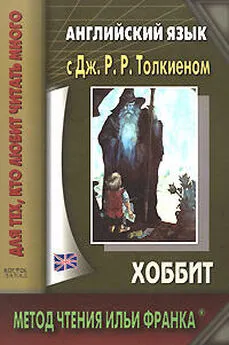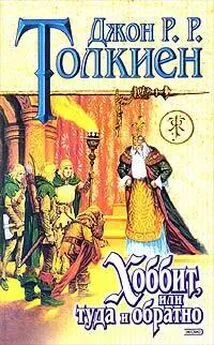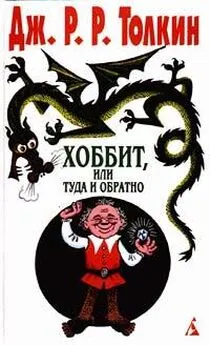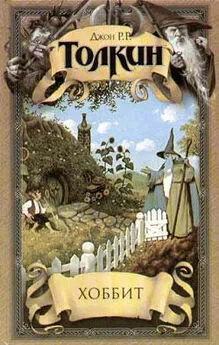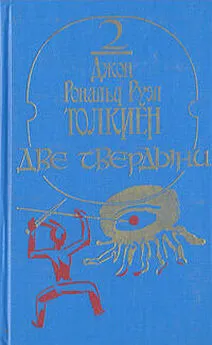Джон Толкиен - Английский язык с Дж. Р. Р. Толкиеном. Хоббит
- Название:Английский язык с Дж. Р. Р. Толкиеном. Хоббит
- Автор:
- Жанр:
- Издательство:АСТ, Восток-Запад
- Год:2008
- Город:Москва
- ISBN:978-5-17-048593-2, 978-5-478-00597-9
- Рейтинг:
- Избранное:Добавить в избранное
-
Отзывы:
-
Ваша оценка:
Джон Толкиен - Английский язык с Дж. Р. Р. Толкиеном. Хоббит краткое содержание
В книге предлагается произведение на английском языке Джона Р. Р. Толкиена «Хоббит», адаптированное (без упрощения текста оригинала) по методу Ильи Франка. Уникальность метода заключается в том, что запоминание слов и выражений происходит за счет их повторяемости, без заучивания и необходимости использовать словарь.
Пособие способствует эффективному освоению языка, может служить дополнением к учебной программе.
Предназначено для студентов, для изучающих английский язык самостоятельно, а также для всех интересующихся английской культурой.
Пособие подготовила Ольга Ламонова.
Английский язык с Дж. Р. Р. Толкиеном. Хоббит - читать онлайн бесплатно полную версию (весь текст целиком)
Интервал:
Закладка:
smith [smɪƟ] apprentice [ǝˈprentɪs] leisure [ˈleʒǝ] marvellous [ˈmɑ: v (ǝ) lǝs]
They built the merry town of Dale there in those days. Kings used to send for our smiths, and reward even the least skilful most richly. Fathers would beg us to take their sons as apprentices, and pay us handsomely, especially in food-supplies, which we never bothered to grow or find for ourselves. Altogether those were good days for us, and the poorest of us had money to spend and to lend, and leisure to make beautiful things just for the fun of it, not to speak of the most marvellous and magical toys, the like of which is not to be found in the world now-a-days. So my grandfather’s halls became full of armour and jewels and carvings and cups, and the toy-market of Dale was the wonder of the North.
“Undoubtedly that was what brought the dragon (без всякого сомнения, именно это и привлекло дракона; to bring (brought) — приносить, приводить ). Dragons steal gold and jewels, you know (драконы крадут золото и драгоценности, как вы знаете), from men and elves and dwarves (у людей, и эльфов, и гномов), wherever they can find them (везде, где они могут их найти); and they guard their plunder (и они охраняют свою награбленную добычу) as long as they live (до самой смерти: «так долго, как они живут») (which is practically forever (то есть, практически, вечно), unless they are killed (если только их не убивают)), and never enjoy a brass ring of it (и никогда не пользуются ни малейшей ее частью; brass ring — досл. латунное колечко ). Indeed they hardly know a good bit of work from a bad (на самом деле, они вряд ли отличат хорошее изделие от плохого ; bit — кусок, частица ), though they usually have a good notion (хотя у них обычно очень хорошее представление) of the current market value (о текущей рыночной стоимости); and they can’t make a thing for themselves (и они сами-то своими руками и сделать ничего не могут), not even mend (даже не могут отремонтировать) a little loose scale (небольшую разболтавшуюся чешуйку; loose — свободный, несвязный ) of their armour (в своей броне). There were lots of dragons (много драконов было) in the North in those days (на Севере в те дни), and gold was probably getting scarce up there (и золото, может быть, становилось там редкостью), with the dwarves flying south (из-за того, что гномы улетали/спасались бегством на юг; to fly (flew, flown) — летать, нестись ) or getting killed (или были убиты), and all the general waste and destruction (и из-за всего того всеобщего уничтожения и разрушений) that dragons make (которые производят драконы) going from bad to worse (становясь все хуже и хуже: «идя от плохого к худшему).
elves [elvz] guard [ɡɑ: d] plunder [ˈplʌndǝ] value [ˈvælju: ] armour [ˈɑ: mǝ]
“Undoubtedly that was what brought the dragon. Dragons steal gold and jewels, you know, from men and elves and dwarves, wherever they can find them; and they guard their plunder as long as they live (which is practically forever, unless they are killed), and never enjoy a brass ring of it. Indeed they hardly know a good bit of work from a bad, though they usually have a good notion of the current market value; and they can’t make a thing for themselves, not even mend a little loose scale of their armour. There were lots of dragons in the North in those days, and gold was probably getting scarce up there, with the dwarves flying south or getting killed, and all the general waste and destruction that dragons make going from bad to worse.
There was a most specially greedy (был там один, самый-самый, особенно жадный; greed — жадность ), strong and wicked worm called Smaug (сильный и злобный змей по имени Смауг). One day (однажды) he flew up into the air (поднялся: «взлетел» он в воздух) and came south (и направился на юг). The first we heard of it (первое, что мы услышали /о нем/) was a noise like a hurricane coming from the North (это был шум, похожий на ураган, идущий с Севера), and the pine-trees on the Mountain (и сосны на Горе) creaking and cracking in the wind (скрипели и трещали на ветру). Some of the dwarves who happened to be outside (некоторые гномы, так уж случилось, были на улице: «снаружи») (I was one luckily (к счастью, я был одним из них) — a fine adventurous lad in those days (прекрасный, любящий приключения парень /был я/ в те дни) always wandering about (всегда бродящий /по окрестностям/) and it saved my life that day (и это-то и спасло мою жизнь в тот день)) — well, from a good way off (так вот, издалека) we saw the dragon (мы увидели, как дракон) settle on our mountain (устроился на нашей горе) in a spout of flame (весь в струях пламени; spout — струя, поток ). Then he came down the slopes (затем он двинулся вниз по склонам) and when he reached the woods (и когда он добрался до лесов) they all went up in fire (все они загорелись огнем). By that time (к этому времени) all the bells were ringing in Dale (все колокола звонили в Дэйле) and the warriors were arming (и воины вооружались). The dwarves rushed out (гномы бросились наружу) of their great gate (через свои главные ворота); but there was the dragon (но там-то и был дракон) waiting for them (поджидающий их). None escaped that way (никто не смог сбежать тем путем). The river rushed up in steam (река быстро превратилась в пар; to rush — бросаться, мчаться ) and a fog fell on Dale (и туман окутал Дейл; to fall (fell, fallen) — падать, опускаться ), and in the fog the dragon came on them (и в этом тумане дракон обрушивался на них) and destroyed most of the warriors (и уничтожил большинство воинов) — the usual unhappy story (обычная печальная: «несчастливая» история), it was only too common in those days (это было более чем обычно в те дни: «она была только слишком обычной в те дни»).
greedy [ˈɡri: dɪ] wicked [ˈwɪkɪd] hurricane [ˈhʌrɪkǝn] adventurous [ǝdˈventʃ (ǝ) rǝs]
There was a most specially greedy, strong and wicked worm called Smaug.
One day he flew up into the air and came south. The first we heard of it was a noise like a hurricane coming from the North, and the pine-trees on the Mountain creaking and cracking in the wind. Some of the dwarves who happened to be outside (I was one luckily — a fine adventurous lad in those days, always wandering about, and it saved my life that day) well, from a good way off we saw the dragon settle on our mountain in a spout of flame. Then he came down the slopes and when he reached the woods they all went up in fire. By that time all the bells were ringing in Dale and the warriors were arming. The dwarves rushed out of their great gate; but there was the dragon waiting for them. None escaped that way. The river rushed up in steam and a fog fell on Dale, and in the fog the dragon came on them and destroyed most of the warriors — the usual unhappy story, it was only too common in those days.
Then he went back (затем он направился назад) and crept in through the Front Gate (и заполз /на Гору/ через Главные Ворота) and routed out all the halls (и уничтожил всех, кто был в залах; to rout — разбивать наголову, обращать в бегство ), and lanes (и переулках), and tunnels (и туннелях), alleys (аллеях), cellars (подвалах), mansions (особняках) and passages (и проходах). After that (после этого) there were no dwarves left alive inside (больше не осталось живых гномов внутри /Горы/), and he took all their wealth for himself (и он забрал себе все их богатство). Probably (возможно), for that is the dragons’ way (из-за того, что именно так принято у драконов; way — зд. уклад, обычай, привычка ), he has piled it all up (он сложил это все вместе) in a great heap (в огромную кучу) far inside (/где-то/ глубоко внутри /Горы/), and sleeps on it for a bed (и спит на ней, как на кровати). Later he used to crawl out (позднее он бывало выползал) of the great gate (из главных ворот) and come by night to Dale (и добирался до ночам до Дейла), and carry away people (и уносил людей), especially maidens (особенно девиц), to eat (чтобы съесть их), until Dale was ruined (до тех пор, пока Дейл не превратился в руины), and all the people dead or gone (и все люди не вымерли или ушли). What goes on there now (что происходит там сейчас) I don’t know for certain (я не знаю наверняка), but I don’t suppose (но я не думаю) anyone lives nearer to the Mountain (что кто-нибудь живет ближе к Горе) than the far edge (чем у дальнего края) of the Long Lake now-a-days (Длинного Озера в наши дни).
rout [raʋt] mansion [ˈmænʃ (ǝ) n] ruin [ˈru: ɪn]
Then he went back and crept in through the Front Gate and routed out all the halls, and lanes, and tunnels, alleys, cellars, mansions and passages. After that there were no dwarves left alive inside, and he took all their wealth for himself. Probably, for that is the dragons’ way, he has piled it all up in a great heap far inside, and sleeps on it for a bed. Later he used to crawl out of the great gate and come by night to Dale, and carry away people, especially maidens, to eat, until Dale was ruined, and all the people dead or gone. What goes on there now I don’t know for certain, but I don’t suppose anyone lives nearer to the Mountain than the far edge of the Long Lake now-a-days.
“The few of us (те немногие из нас) that were well outside (что были снаружи) sat and wept in hiding (сидели и рыдали в укрытии), and cursed Smaug (и проклинали Смауга); and there we were unexpectedly joined (и там к нам неожиданно присоединились) by my father and my grandfather (мой отец и мой дед) with singed beards (с опаленными бородами). They looked very grim (они выглядели очень мрачными/суровыми) but they said very little (но говорили они очень мало). When I asked how they had got away (когда я спросил, как они выбрались), they told me to hold my tongue (они велели мне придержать мой язык), and said that one day in the proper time (и сказали, что однажды, в нужное время) I should know (я узнаю). After that we went away (и после этого мы ушли), and we have had to earn our livings (и нам пришлось зарабатывать себе на жизнь; living — средства к существованию ) as best we could (в меру своих сил) up and down the lands (по всем землям; up and down — вверх и вниз, туда и сюда, везде ), often enough (достаточно часто) sinking as low as blacksmith-work (опускаясь так низко, чтобы заниматься ремеслом кузнеца) or even coalmining (или даже добычей угля; coal — уголь ). But we have never forgotten (но мы так никогда и не забыли) our stolen treasure (о нашем украденном сокровище). And even now (и даже теперь), when I will allow (когда я признаю; to allow — позволять, допускать ) we have a good bit laid by (что у нас отложено достаточно) and are not so badly off (и мы не так уж и плохо обеспечены) ” — here Thorin stroked the gold chain (при этих словах: «здесь» Торин погладил золотую цепь) round his neck (на: «вокруг» своей шее) — “we still mean to get it back (мы все еще хотим вернуть его; to mean — намереваться; подразумевать ), and to bring our curses home to Smaug (и привести наши проклятия Смаугу в действие; to bring smth. home to smb. — втолковать кому-либо что-либо ) — if we can (если мы сможем).
Читать дальшеИнтервал:
Закладка:
